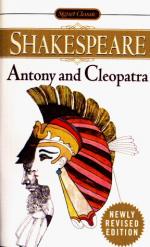|
This section contains 7,699 words (approx. 26 pages at 300 words per page) |

|
SOURCE: “Blessed When They Were Riggish: Shakespeare's Cleopatra and Christianity's Penitent Prostitutes,” in Journal of Medieval and Early Modern Studies, Vol. 22, No. 3, Fall, 1992, pp. 429-49.
In the following essay, King suggests that Shakespeare portrays competing images of the “penitent prostitute” in the characterization of Cleopatra, who resembles prostitute-saints of the Middle Ages. Like these women, Cleopatra is associated with both sexual incontinence and supernatural power.
All eroticism has a sacramental character.
—Georges Bataille, Erotism1
Her sins, which are many, are forgiven, for she loved much.
—Luke 7:47
Among the extraordinary claims Enobarbus makes for Cleopatra in the second act of Antony and Cleopatra is that “the holy priests / Bless her, when she is riggish” (2.2.239-40).2 Concluding one of Shakespeare's most paradoxical passages, this final paradox alienates Cleopatra utterly from ecclesiastically sanctioned sexual values of early seventeenth-century England, at the same time linking her to the sacred eroticism of ancient...
|
This section contains 7,699 words (approx. 26 pages at 300 words per page) |

|


